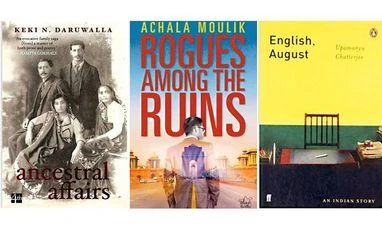It’s strange but true. Celebrated, usually sotto voce, by a very tiny section of the media and largely unappreciated by the ever-dwindling group that reads English novels — or reads anything at all that’s longer than 800 words — there lurks in India a very unique creature, the babu who writes novels, short stories and poems.
Until about the mid-1980s, bureaucrats had to know “good” English. This meant not only did they have a large vocabulary, they also had to string these words together in a grammatically correct way, complete with articles and the correct prepositions. That last skill is pretty much gone now.
Some of these writer-bureaucrats would have made an excellent living as writers. But perhaps preferring a more certain income stream, they remained bureaucrats. Nevertheless, they have written novels, short stories and poems.
How they found the time for it is a mystery. Less gifted and unkind colleagues have always had a ready explanation. Writing is a time consuming pastime. So there’s some merit in their explanation.
Be that as it may, we now have a fairly large number of civil servants who have turned out some excellent novels in English. Doubtless many have written in Indian languages, too, like N Madhavan who is a highly celebrated novelist in Malayalam. There must be others as well.
What is worrisome is whether this is a vanishing species: After all, to be able to write a good novel in English, you have to know good English. But as I mentioned earlier, the overall number of such Indians and within that, the number bureaucrats, is minuscule now — and within that the number who are inclined and capable of writing a novel is microscopic.
Labour of love: The passion where it exists has to be a labour of love because what these guys earn from their writings is nowhere commensurate with the effort they have to put in. Nor is that, like professional writers, this is the only thing they do, even after retirement.
What is striking is how proficient they are at what is clearly a hobby and not a calling. Imagine returning home at 8 pm after a long day of meetings and other boring things and then writing the mandatory 500 words before turning in. It can’t be easy at all.
(Book Cover) Jinnah Often Came to Our House
Nor is there a sameness about the stories they tell. The easiest thing would be to write about the government or the bureaucracy but mercifully they have largely avoided the temptation.
The DMs and the SP: In English, everyone thinks it was Upamanyu Chatterjee of English, August fame, who was the pioneer amongst the bureaucrats in the novel-writing business. In fact, however, it was Keki N Daruwalla, who was in the police.
His first novel, as far as I know, was The Keeper of the Dead. It was published in 1982. It’s quite a bizarre book, quite unlike his later novels. He has written several of these, all of which I have read because they are so good and diverse in their choice of themes. The book about Junagarh, called Ancestral Affairs is a good example.
He has also written short stories. Islands has some very smart stories. So does Love Across the Salt Desert. But it is poetry that he is known for. He has published several volumes of poems and won awards as well.
Then there’s Bhaskar Ghosh, of the 1960 batch, who wrote two novels after retirement. The style is as polished as anyone would wish for, very precise and almost clipped.
The first one is about an IAS officer of the West Bengal cadre and has a somewhat autobiographical flavour to it. The second is based on the Oedipus complex and has a rather fanciful plot. But it’s highly readable.
One must not also forget Achala Moulik who has written a novel about the Archaeological Survey of India and the travails of the honest people who run it. She was its director for a while. She has written several other books as well that are not novels.
Tino de Sa is another IAS man who has written some very nice short stories. He served for a long time as the chief secretary of Madhya Pradesh.
Diplomats-who-write: But it is the foreign service officers, doubtless because they have a lot of time to spare when abroad, who have been the most prolific. Offhand, I can think of five that I have read.
Kiran Doshi, an old friend, once wrote a novel in verse, not to mention the award-winning novel Jinnah Often Came to Our House. It is truly magnificent. He has also written some short stories. He writes like he speaks — sardonically.
Krishnan Srinivasan, who retired as foreign secretary, has created an ambassador called Michael Marco who has many adventures. These books —Srinivasan has written many other books — are in the thrillers/crime genre and have a wonderfully ironic undertone.
Navtej Sarna, who was our ambassador to the US, has also written some very nice historical novels and short stories.
There’s Vikas Swarup, of Slumdog Millionaire fame, who retired quite recently. He has written four other novels and some short stories. There’s Rajiv Dogra, too, who has written a romantic novel.
Barring Doshi, however, none of them comes close to the gold standard set for diplomats-who-write by Lawrence Durrell, whose Antrobus series about diplomatic life is a classic in the genre. But then, Durrell was a professional writer and an Englishman to boot. So perhaps the comparison is unfair.














)
